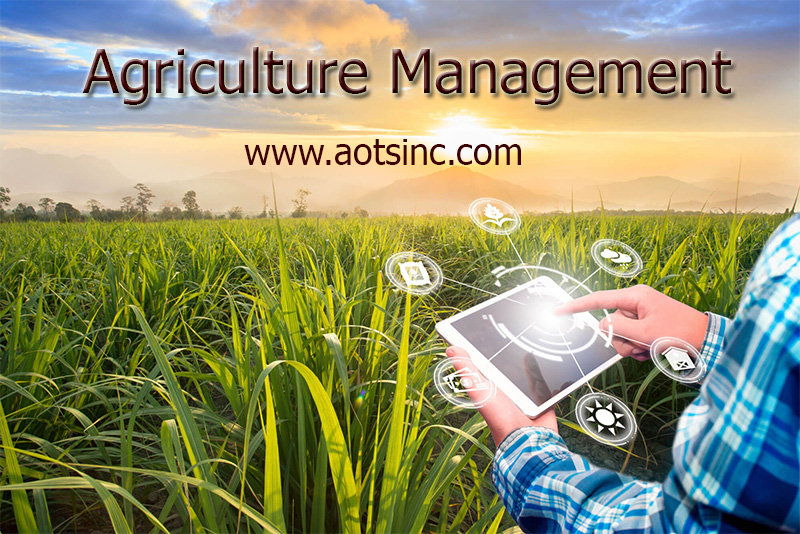Introduction:
Agriculture management is the backbone of sustainable and productive farming practices. It encompasses a wide range of activities, strategies, and tools that farmers and agricultural professionals employ to ensure the efficient use of resources, maximize crop yields, and protect the environment. In an era where global food security and environmental sustainability are paramount concerns, effective agriculture management plays a crucial role in addressing these challenges. This article delves into the significance of agriculture management and the various aspects that contribute to its success.
Planning and Decision Making:
One of the fundamental aspects of agriculture management is strategic planning and decision-making. Farmers need to carefully consider factors such as crop selection, planting and harvesting schedules, irrigation methods, and the use of fertilizers and pesticides. These decisions impact not only the farm’s economic viability but also its ecological footprint. A well-thought-out plan can lead to higher yields, reduced resource wastage, and increased profitability.
Soil Health and Conservation:
Maintaining soil health is central to successful agriculture management. Healthy soil is rich in essential nutrients, retains water effectively, and supports strong root systems. Soil conservation practices, such as crop rotation, cover cropping, and reduced tillage, prevent erosion and degradation. Proper soil management promotes long-term sustainability and reduces the need for chemical inputs.
Water Resource Management:
Water is a finite and increasingly precious resource, making its efficient management vital to agriculture. Proper irrigation systems, water storage, and the monitoring of water usage are critical aspects of agriculture management. Sustainable water management ensures crops receive adequate hydration while minimizing wastage and environmental impact.
Pest and Disease Control:
Agriculture management also includes effective pest and disease control strategies. Integrated pest management (IPM) is a holistic approach that minimizes the use of chemicals by combining various preventive measures, like crop rotation and biological pest control, with careful monitoring and targeted treatments. Reducing the reliance on pesticides benefits both the environment and human health.
Technology and Innovation:
Advancements in technology have revolutionized agriculture management. Tools like precision agriculture, GPS-guided equipment, and data analytics enable farmers to make more informed decisions and optimize resource utilization. Technology also offers the potential to reduce waste, lower costs, and enhance productivity.
Sustainability and Environmental Responsibility:
In today’s world, responsible agriculture management extends beyond maximizing profits; it includes a commitment to environmental sustainability. Sustainable farming practices, like organic farming and agroecology, prioritize ecological balance and the long-term health of the land. Such approaches contribute to a more resilient and harmonious agriculture system.
Understanding Agricultural Expenses:
Agricultural expenses encompass a wide range of costs, including but not limited to:
- Input Costs:
- These include seeds, fertilizers, pesticides, and other materials required for crop cultivation or livestock management.
- Labor Costs:
- Expenses associated with hiring and compensating farm labor, which may include seasonal or full-time workers.
- Machinery and Equipment:
- Costs related to the purchase, maintenance, and operation of agricultural machinery and equipment.
- Land and Infrastructure:
- Expenses associated with land acquisition, leasing, and maintenance of farm infrastructure such as barns, storage facilities, and irrigation systems.
- Utilities:
- Costs of utilities like electricity, water, and fuel for irrigation and power machinery.
- Financial Services:
- Interest on loans, insurance premiums, and other financial obligations.
- Marketing and Distribution:
- Expenses related to the marketing and distribution of agricultural products, including transportation and storage costs.
Expense Management Strategies:
- Budgeting:
- Creating a detailed budget is the cornerstone of effective expense management. Farmers should identify and prioritize their expenses, taking into account variable and fixed costs, and allocate resources accordingly.
- Efficient Resource Allocation:
- Farmers should aim to optimize the use of resources, including land, labor, and machinery. Implementing precision agriculture techniques, such as GPS-guided equipment and data analytics, can help maximize resource efficiency.
- Risk Assessment and Mitigation:
- Farmers should anticipate and plan for potential risks, such as weather fluctuations, market volatility, or disease outbreaks, by diversifying crops, purchasing insurance, and maintaining financial reserves.
- Input Cost Reduction:
- Examining input costs is essential. Implementing sustainable farming practices, like crop rotation, organic farming, and integrated pest management, can reduce the need for expensive inputs such as pesticides and synthetic fertilizers.
- Labor Management:
- Efficient labor management is crucial. Hiring skilled labor, offering fair compensation, and providing training can improve productivity and reduce labor costs in the long run.
- Machinery and Equipment Maintenance:
- Regular maintenance and proper use of machinery and equipment can extend their lifespan and reduce repair and replacement expenses.
- Sustainable Practices:
- Embracing sustainable agriculture not only benefits the environment but can also lower long-term costs by reducing the need for costly inputs and promoting soil health.
- Financial Analysis:
- Regular financial analysis can help farmers identify inefficiencies and make informed decisions to improve expense management.
- Market Research:
- Staying informed about market trends and consumer demands can help farmers make informed decisions about crop selection, pricing, and marketing strategies.
- Compliance and Reporting:
- Adhering to local and national regulations and maintaining accurate financial records is essential to avoid legal issues and manage expenses effectively.
- Risk Mitigation:
- Agriculture management strategies often focus on risk mitigation. Climate change, market volatility, and unforeseen events can disrupt farming operations. Diversification, insurance, and financial planning are essential components of risk management in agriculture.
- Compliance and Regulations:
- Agriculture management also involves adhering to local and national regulations. Compliance with environmental laws, safety standards, and labor regulations is essential to avoid legal issues and maintain a positive reputation.
Conclusion:
Agriculture management is a multifaceted discipline that underpins sustainable and successful farming. As global challenges related to food security and environmental conservation continue to intensify, effective management practices are more crucial than ever. Farmers and agricultural professionals must adopt a proactive, holistic approach to address the diverse challenges of modern agriculture. By integrating planning, sustainability, technology, and environmental responsibility, they can ensure that agriculture remains a resilient and productive industry for future generations.
